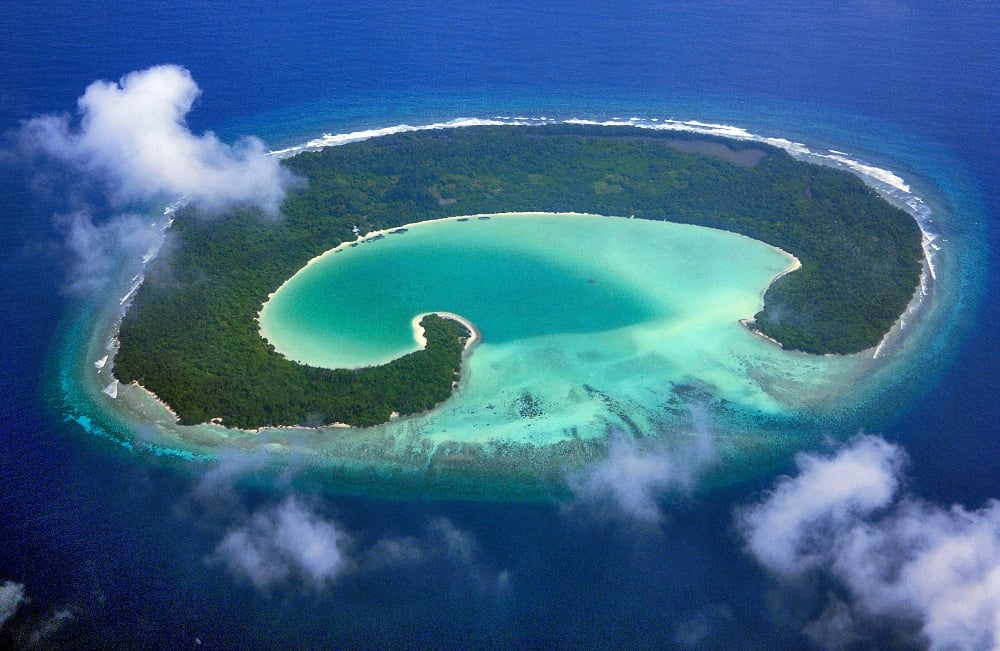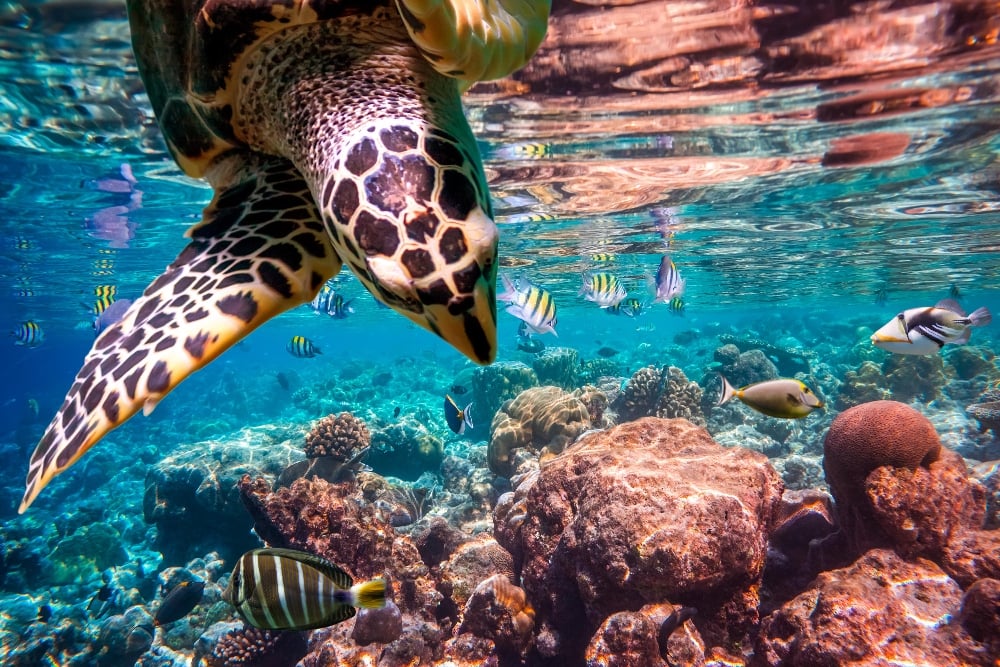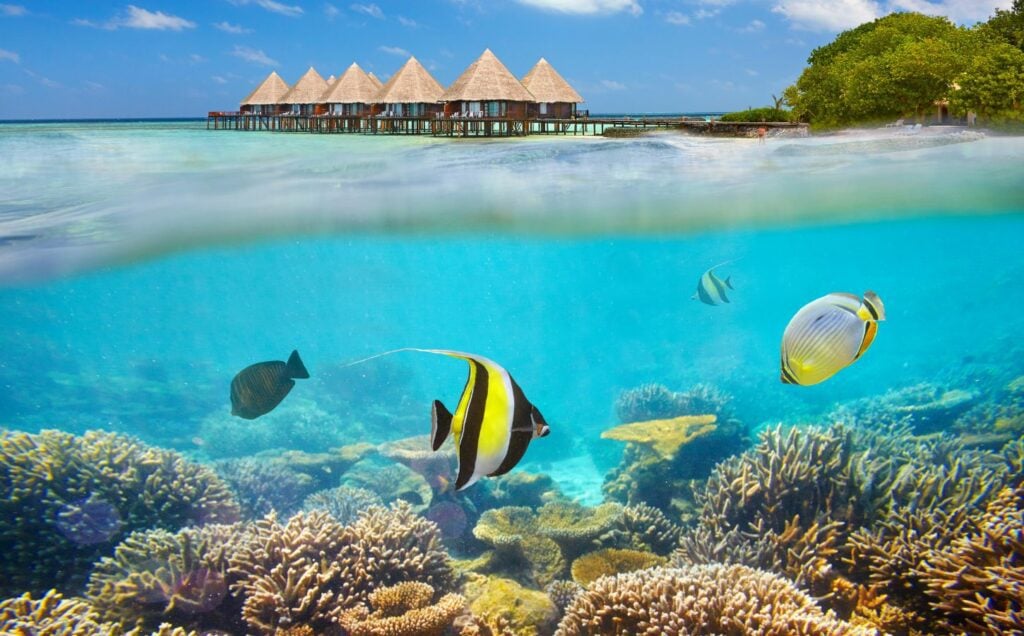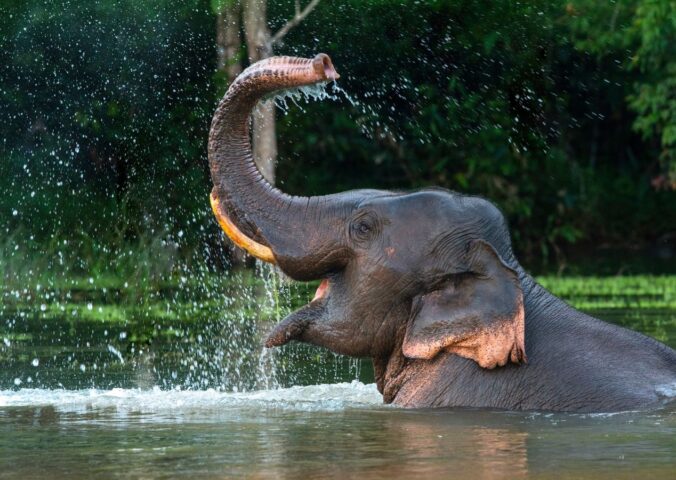The Maldives. Famed for its peacock blue seas, vibrant white sands, and atolls so clear you can see all the way back to your penthouse apartment back home.
But unlike the clarity of its oceans, this magical country is hiding a dark secret that you can’t see on Instagram. There’s a huge elephant in the room… and that elephant is fighting for its life.
Those glistening white sandy beaches and clear oceans are both a blessing and a curse. Without them, the Maldives wouldn’t be the tourist destination it is. But with them, it is officially the flattest country in the world. The highest point is 2.4m above sea level, with the average elevation at only 1.5m (for comparison, the UK average is 162m).
The result of this is that, by 2050, 80 percent of its islands could become uninhabitable at current global warming rates. Despite only being responsible for around 0.003 percent of global emissions, the island is set to be adversely affected by the climate crisis.
Currently, more than 90 percent of the islands in the Maldives have severe erosion, and 97 percent of the country no longer has fresh groundwater (the water found beneath the Earth’s surface).
The bad news continues when it comes to the very thing the Maldives’ famous ring-shaped islands (called “atolls”) are made of – coral. Aside from its physical beauty, coral plays a huge role not only in luring selfie-seekers (coral reefs are worth in excess of $35 billion to tourism worldwide), but in providing both an ecosystem and a natural sea defense to the islands.

In 2016, the Maldives lost its front line of defense when the devastating bleaching event affected about 60 percent of the coral reefs. Many of these haven’t recovered since.
Coral’s role in climate crisis mitigation
Time for some good news? Yes please!
Without boring you with the science, coral are rather remarkable organisms. Due to their colonial nature – most coral are a cluster of individual but interdependent animals, called polyps – they can actually be cloned. In simple terms, small coral fragments can be taken from large corals to be regrown and replanted.
One of the country’s leading eco-resorts, Gili Lankanfushi, was the first resort in the Maldives to develop a specific coral reef recovery technique. The project has been thriving since it commenced in 2014, and I spent some time with the on-site marine biologist to learn how it works.
The method is simple, but effective. Coral fragments are taken from vulnerable and loose corals found on the reef, and are carefully inserted onto ropes (lines). The lines are then fixed to frames five meters below the surface of the resort’s lagoon. These small coral fragments are monitored, away from the reach of predators and waves, for around three years before being transplanted onto degraded reef areas.
With every rope housing 20 to 50 small living coral fragments, the corals in the surrounding area grow stronger and bigger over time. During their time on the lines, the fragments also provide a nursery for a huge array of baby reef fish and crustaceans, and when they are eventually transplanted, they improve the health of the reef itself.
A sustainable plant-based system

On top of this, the resort is one of very few to offer an entirely plant-based menu for guests to enjoy, something I’ve never experienced before. Head Chef Harinath Govindaraj is extremely passionate about plant-based cooking, and has cultivated an entire garden containing fruits, herbs, and vegetables to reduce the need for imports.
What’s more, an advanced rocket composter can process up to 100 percent of the resort’s food waste, producing compost which in turn nurtures the island’s extensive organic herb garden.
Seaweed is also collected daily when washed up on the beach and composted on site. Withered palm tree leaves are collected and used as roofing, and the Robinson Crusoe-esque accommodation is made from old drift wood and recycled telephone poles.
There is a real cyclical nature of what is found on the island – not only is it from-farm-to-food, it is also a case of from-island-to-home. With the sustainable ethos running strong in its veins, they also ensure there is no plastic used on site and guests are encouraged to take rubbish and empty toiletry bottles home with them to help preserve the paradise.
The importance of seagrass
I was very surprised (and delighted!) to see the resort is one of only very few in the country to not remove its seagrass. In fact, they’ve pledged to protect 1,250m2 worth.
This is hugely significant as many neighboring resorts remove their seagrass as it detracts from the insta-worthy, perfect blue pictures so many of us like to scroll through.
But the importance of leaving it there is huge. The ocean absorbs around 25 percent of all carbon, and 18 percent of that is by seagrass. Seagrass only makes up 0.1 percent of the ocean bed, so it’s an incredibly effective carbon sink.
Little things like this may seem small to many of us, but these changes are vital for a country fighting against the clock for its survival. And it doesn’t stop there. It’s a mindset, and Gili Lankanfushi is leading the way when it comes to forward eco-thinking. This is something visitors are becoming more and more passionate about too.
Article continues below this image.
The fight to save the Maldives
On a larger scale, in a joint venture with the Maldivian government, a Floating City is in the process of being built just off the capital, Male. The proposed city will have a nature-based structure of roads and water canals resembling the way in which real brain coral is organized. It’s being built across nearly 500 hectares, and will be home to thousands of people and resorts.
Politically, the government is only too aware of how important the natural beauty of the islands are to its longevity. Last year, the Maldives released updated targets to reduce 26 percent of its emissions and achieve net zero carbon emissions by 2030, bringing it in line (if not ahead of) many Western emissions targets.
Whether it’s high-tech geo-engineering, or simply tying coral fragments to a line and watching them grow, the Maldives might be down, but it’s not out.






